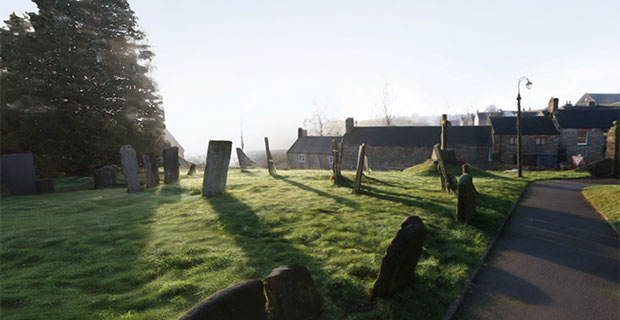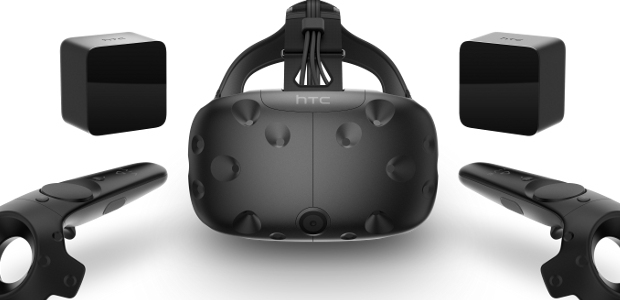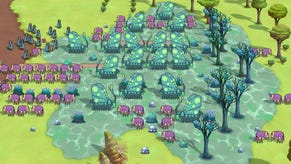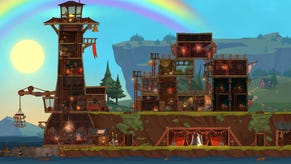"We're building 3 full VR games, not experiments"- Valve
Believes huge tech improvements incoming
Given they're at the forefront of virtual reality tech, it's kind of odd that Valve don't have a full-fat VR game to boast of themselves. We've had a few experiments, most notably minigame collection The Lab and armchair tourism app Destinations, but nothing that really justifies spending hours and hours and hours in your gogglebox of choice. Well, that's going to change, as Gabe Newell hisself has confirmed that no less than three "full" VR games are in development. He's also bullish that the technology, though it would seem to be no runaway commercial success as yet, is bound for great things.
"It feels like we've been stuck with mouse and keyboard for a reeeaaally long time," said Newell in studio visit attended by Eurogamer, amongst others, "and that the opportunities to build much more interesting kinds of experiences for gamers were there, we just need to sort of expand what we can do. But it's not about being in hardware, it's about building better games. It's about taking bigger leaps forward with the kinds of games that we can do."
Of the games Valve are making, Newell said that "Right now we're building three VR games. When I say we're building three games, we're building three full games, not experiments." So whatever they are, they won't be shorties you play once then only bust out again when you want to justify your expensive hardware to a bemused visiting relative.
It seems that straight VR adaptations of or sequels to existing Valve titles is not the plan, mind you. "VR is not going to be a success at all if people are just taking existing content and putting it into a VR space. One of the first things we did is we got Half-Life 2 and Team Fortress running in VR, and it was kind of a novelty. That was purely a developer milestone, but there was absolutely nothing compelling about it, the same way nobody's going to buy a VR system so they can watch movies."
I half-agree - in my own attempts at playing traditional games in VR, with the likes of VorpX or even just giant virtual screen apps, the awe factor has soon worn off, to be replaced with discomfort, and so I return to my monitor instead.
However, there really haven't been many trad. games specifically made with VR in mind, so as yet we all remain somewhat in the dark about what the experience may be like, as well as often feeling disappointed by the minigamey or hands-off nature of the dedicated VR games we do get. The notable exception to this is Resident Evil 7 on PlayStation VR, which has been extremely well-received - sadly exclusivity agreements keep it from PC, for now at least. It suggests that there is a capability for this stuff, but few big studios are truly exploring it.
Newell, though, seems to be maintaining an argument I heard Valve's Chet Faliszek espouse at Rezzed a couple of years ago, which was that no-one really knew what VR gaming would become - that the right sorts of games have yet to be created. Hopefully, maybe, Valve have come up with solid concepts for said right sorts of games, and it's that which we'll see in this mysterious trio of titles.
He does note that developing for specific hardware is one of the reasons that Nintendo's Shigeru Miyamoto has had such a solid, inventive run of Mario, Zelda and other titles on multiple generations of hardware. "He's had the ability to think about what the input device is and design a system while he designs games. Our sense is that this will actually allow us to build much better entertainment experiences for people."
However, here's something I flat-out disagree with. "If you took the existing VR systems and made them 80 per cent cheaper there's still not a huge market, right? There's still not an incredibly compelling reason for people to spend 20 hours a day in VR. Once you've got something, the thing that really causes millions of people to be excited about it, then you start worrying about cost reducing. It's sort of the old joke that premature cost reduction is the root of all evil."
Says the architect of an online store that's increasingly notorious for declining prices and deep discounts, but that's not what I disagree with. 80% cheaper? You do that and a shedload of people are going to be pick up the hardware, won't feel so strongly that the software currently available doesn't justify the cost, and then you have a big audience that is absolutely going to leap on and evangelise about whatever actually cool thing is Valve's on about. Right now, what we've got is a market turning increasingly sour about VR, and, no matter how cool the thing is, a whole bunch of people who need far more convincing than ever before. We've heard this one before, right? Fool me once, shame on me, etc...
But hell, he's the billionaire and I'm not, so maybe he does know best. It's just that it feels as though VR has stumbled badly once already, and probably can't bear that happening a second time. Newell does promise that major advances in VR resolution are happening, which is going to help with the image quality side of things.
"We're actually going to go from this weird position where VR right now is kind of low-res, to being in a place where VR is actually higher res than just about anything else, with much higher refresh rates than you're going to see on either desktops or phones. You'll actually see the VR industry sort of leapfrogging pretty much any other display technology in terms of those characteristics. It's probably not obvious from the first generation of products, but you'll start to see that happening like in 2018-2019."
Great, but it depends whether that is based on a belief that we'll all have suitably powerful graphics cards to fuel 4K or higher graphics by that point, or whether, as some predict, VR software will be able to move further away from essentially having to render each frame twice (on per eye) and can find some trickery to make it all a lot less demanding. And, of course, there's the comfort issue too. Still, it's good to see Valve aren't abandoning VR based on a somewhat messy first generation - let's hope they can really pull it off second time around.
More Newell comments, including why they got involved in hardware as well as software and how he has got it wrong about Nintendo systems in the past, over at Eurogamer.












